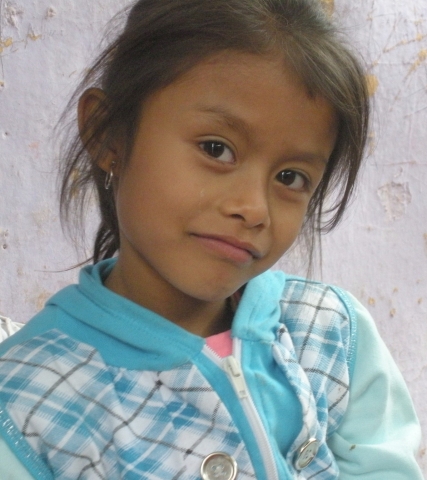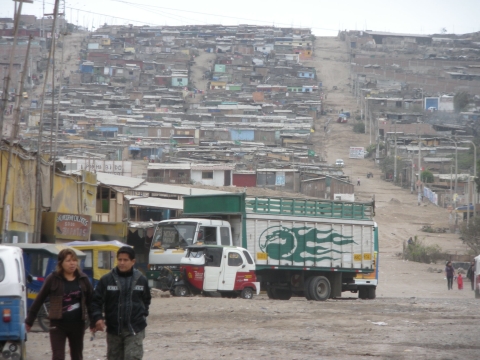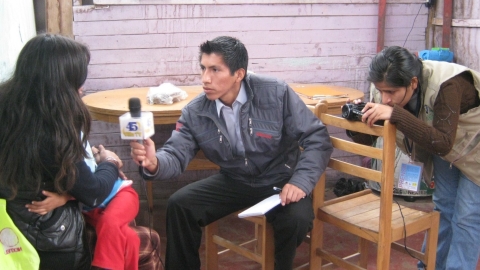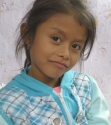
Emily is eight years old, and suffers from a rare disorder. Her story gave Villa TV 45 an opportunity for "social journalism," and a chance to change Emily's life.

Villa El Salvador, where Emily lives with her family, was started in the 1970's by immigrants looking for a better life.

Villa TV 45 has an audience of about two million viewers. Here, a reporter and photographer interview Emily's mother. After the story was broadcast, offers to help came in.

Emily is eight years old, and suffers from a rare disorder. Her story gave Villa TV 45 an opportunity for "social journalism," and a chance to change Emily's life.
And it’s the reality of this landscape that dictates the types of stories Villa TV 45 covers. Their nightly newscast reaches about 2 million people, and they report mostly on small business, crime, and lots of politics. In recent years, Villa El Salvador has become the ‘it’ place for politicians to campaign due to the sheer numbers of voters who live there. For example, the final televised debate between the two leading candidates for mayor of Lima took place at the Villa TV 45 studios.
But the station also likes to practice what the reporters told me was social journalism. And Emily’s story was the perfect example. They wanted to help the little girl raise the $5,000 needed for her operation. Emily was born with an enlarged bowel, and a small anus which makes for a deadly combination. She can’t feel when she needs to go to the bathroom, so she has to wear diapers. The medicine she must take twice a day forces her small body to expel what she has eaten from both ends; it always makes her throw up.
It was the perfect story to practice shooting techniques even though we hadn’t covered that yet. Still, we climbed the steep sandy hill to her house in an area jam-packed with squatters. That’s how Villa El Salvador started in the 1970s, as those looking for a better life migrated to Lima and settled in whatever land they could find. Emily’s house has electricity but no running water.
In a way, it all tied together as Villa TV 45 barely has enough resources to get on the air. Their daily, one hour newscast Infosur is produced with only one edit bay, which includes the only computer to do graphics, and with enough power to upload videos. They have two cameras (no tripods), five full-time employees and about half a dozen interns who help carry most of the load. They’re young and don’t have a lot of experience, but they are very anxious to learn.

Emily is eight years old, and suffers from a rare disorder. Her story gave Villa TV 45 an opportunity for "social journalism," and a chance to change Emily's life.
Last August TV Cultura and Villa TV 45 signed a partnership agreement to join forces. As a production house, TV Cultura needs Villa TV’s signal, and Villa TV 45 needs the experience and resources that TV Cultura brings. The good news is pretty soon Red TV’s national newscast Enlace Nacional will be seen in Lima for the first time.
Emily’s two-minute story aired that evening, with her mother even being a guest on the show. And the story was uploaded onto Infosur’s newly launched Facebook page, the best alternative since they don’t have a website. The reaction was immediate with a local rock band offering to give a free concert to help raise money, and a local non-profit taking up her cause.
Emily’s story demonstrates the challenge Red TV faces trying to merge diverging regions and outlooks in a country that is incredibly centralized. I know stories like these don’t necessarily impact a large number of people, but they do touch hearts as demonstrated by the instant reaction from viewers who barely have more than she does.

Emily is eight years old, and suffers from a rare disorder. Her story gave Villa TV 45 an opportunity for "social journalism," and a chance to change Emily's life.